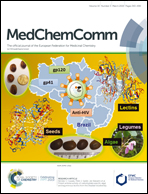Conformationally restricted quinazolone derivatives as PI3Kδ-selective inhibitors: the design, synthesis and biological evaluation†
Abstract
A series of structurally novel quinazolone-based PI3Kδ-selective inhibitors were designed and synthesized via the approach of conformational restriction. The majority of them exhibited two-digit to single-digit nanomolar IC50 values against PI3Kδ, along with low micromolar to submicromolar GI50 values against human malignant B-cell line SU-DHL-6. The representative compound, with the most potent PI3Kδ inhibitory activity (IC50 = 6.3 nM) and anti-proliferative activity (GI50 = 0.21 μM) in this series, was further evaluated for its PI3Kδ selectivity, capability to down-regulate PI3K signaling in SU-DHL-6 cells, in vitro metabolic stability, and pharmacokinetic (PK) properties. The experimental results illustrated that this compound, as a promising lead, merits extensive structural optimization for exploring novel PI3Kδ-selective inhibitors as clinical candidates.



 Please wait while we load your content...
Please wait while we load your content...